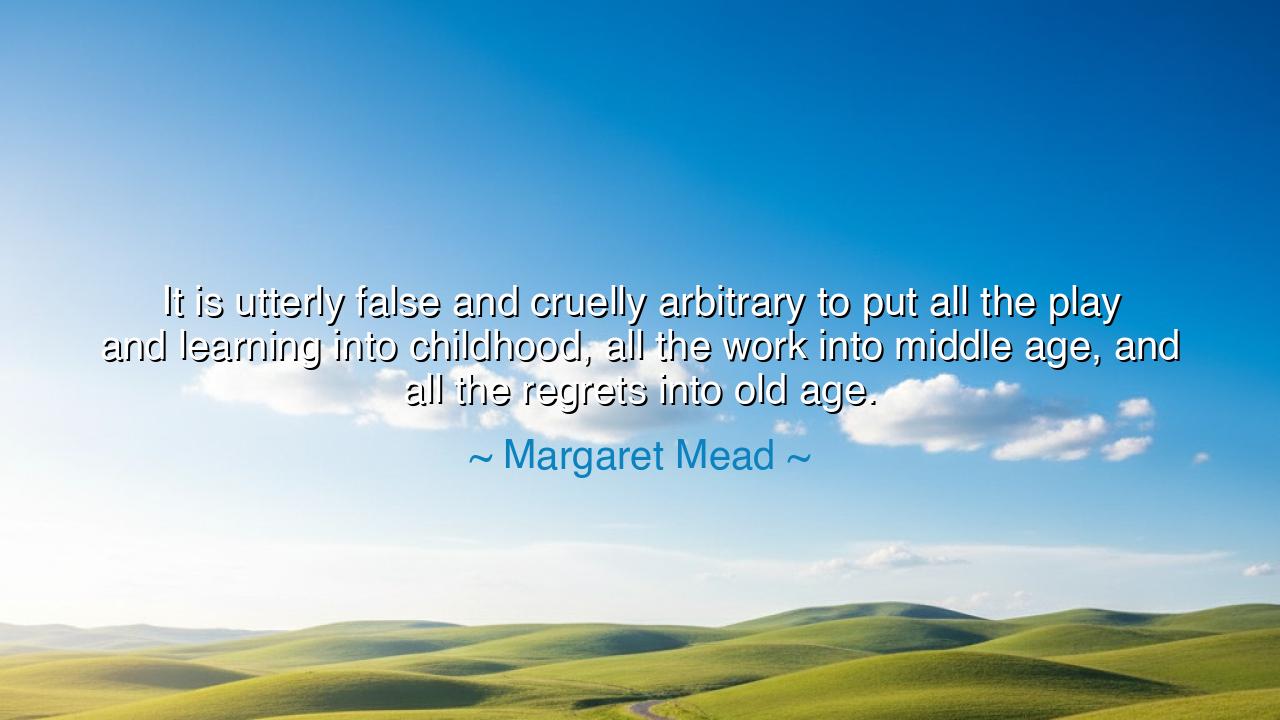
It is utterly false and cruelly arbitrary to put all the play and
It is utterly false and cruelly arbitrary to put all the play and learning into childhood, all the work into middle age, and all the regrets into old age.






In the great cycle of life, from the dawn of youth to the twilight of old age, there is a prevailing belief that each stage is fixed, confined to certain roles, and limited in its potential for growth and joy. Yet, as Margaret Mead so powerfully states, "It is utterly false and cruelly arbitrary to put all the play and learning into childhood, all the work into middle age, and all the regrets into old age." These words carry the weight of wisdom born from observing the lives of countless souls who, bound by these arbitrary divisions, have failed to realize that life is a continuum, where each stage should not be seen as an isolated chapter but a harmonious whole, constantly evolving and offering new opportunities for growth, purpose, and joy.
The ancients understood the fluidity of life and the interconnectedness of its phases. In the story of Odysseus, we see a man who, even in the twilight of his years, continues to seek adventure, wisdom, and growth. His journey does not end with the comforts of age, nor does he give in to the expectation that old age must be a time of quiet regret. Rather, Odysseus embodies the spirit of a life in constant motion, where the play of youth and the work of middle age blend together, and where the reflections of age become wisdom rather than regret. In his story, the journey never ends. It is a continuous cycle of learning, striving, and becoming.
Consider, too, the great Socrates, whose life was not bound by the expectations of his time. Though he was in his later years when he began to question the nature of knowledge and virtue, he continued to learn and to teach. The work of his life, his relentless search for truth, did not end in middle age but stretched into old age, where he found new depths of understanding. He famously declared, "I know that I am intelligent, because I know that I know nothing." His willingness to engage in the learning process, regardless of age, stands in stark contrast to the modern notion that learning is the domain of youth. For Socrates, age was not a barrier to growth; it was an opportunity to deepen the understanding of the world and of oneself.
Margaret Mead’s statement challenges us to reject the notion that each stage of life is fixed, with its own predetermined responsibilities and limitations. She speaks to the reality that the human spirit is capable of continuous play, learning, and purpose, no matter how old we are. The regrets of old age are not inevitable; they are the result of a life that has been prematurely confined to work and obligation, leaving no room for creativity or the joy of continued discovery. Old age should not be a time for looking back with sorrow but for looking forward with the knowledge that life is always full of new experiences, new growth, and new wisdom to gain.
Think of the story of Leonardo da Vinci, who, even in his later years, continued to push the boundaries of art and science. In his 60s, when many might have considered retiring from the demands of the world, he was still engaged in creating, learning, and teaching. His exploration of human anatomy, his designs for flying machines, and his ever-deepening understanding of the world were not confined to the early or middle years of his life, but expanded into his final years, showing us that creativity and learning should not be the sole domain of youth but should continue to bloom throughout life.
The lesson here is clear: to divide life into rigid sections—play in youth, work in middle age, and regret in old age—is to deny the potential for growth, joy, and meaning at every stage. We must learn to see life as a continuous unfolding, where each phase builds upon the one before it, allowing us to play, work, and reflect in ways that are meaningful at every age. Margaret Mead’s words serve as a reminder that age is not a barrier, but an opportunity for new experiences, new learnings, and new contributions to the world.
Practical action calls us to embrace the fullness of life at every age. Young or old, we must strive to find room for play, for learning, and for purpose in every chapter of our lives. Let us not limit ourselves to the roles that society or tradition have prescribed, but seek to create lives that are rich with growth, creativity, and joy. Whether we are in the spring of our youth, the summer of our prime, or the autumn of our later years, we must remain open to new experiences, and continue to evolve in mind, body, and spirit. For in embracing the fluidity of life, we unlock the true potential of every age.






AAdministratorAdministrator
Welcome, honored guests. Please leave a comment, we will respond soon